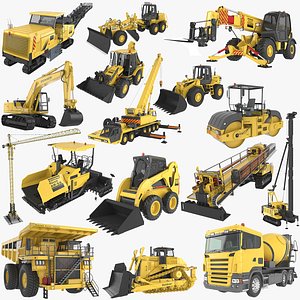Understanding the Cost-Effectiveness of Heavy Equipment Rental Providers for Various Industries
As sectors progressively seek to optimize their operational expenditures, the evaluation of hefty devices rental services emerges as a vital consideration. What elements should companies weigh in this formula, and exactly how do real-world situations illuminate the broader effects?
Advantages of Heavy Tools Rental

The many advantages of heavy equipment leasing make it an enticing option for many organizations in the building and construction and industrial sectors. Among the main advantages is adaptability; companies can select equipment tailored to their certain task needs without the obligation of lasting ownership. This flexibility allows for the reliable allotment of sources, enabling companies to scale procedures based on need.
Furthermore, renting hefty tools dramatically lowers maintenance and storage space prices. Rental companies usually deal with regular maintenance, ensuring that the devices remains in optimal condition and certified with safety guidelines. This setup minimizes the worry on businesses that may not have the expertise or resources to preserve intricate machinery.
Additionally, access to the most up to date technology is another notable benefit. Rental solutions regularly upgrade their inventory, supplying organizations with state-of-the-art equipment that improves efficiency and performance. This gain access to can bring about improved project outcomes and competitive benefits.
Lastly, the rental model allows companies to save funding, freeing up funds that can be redirected toward other operational requirements or financial investments. Collectively, these benefits contribute to the growing pattern of equipment service as a critical choice for numerous markets.
Price Comparison: Renting Out Vs. Acquiring
Reviewing the monetary ramifications of hefty tools purchase is crucial for services considering their options. The choice to lease or buy hefty equipment can substantially affect a business's budget plan and operational capacities.
When contrasting expenses, renting commonly offers a reduced upfront economic commitment. Companies just pay for the period of equipment use, liberating funding for various other investments. Additionally, rental agreements typically include maintenance and assistance, additional reducing unanticipated expenses related to ownership.
Conversely, acquiring devices requires higher initial prices, in addition to continuous expenditures such as insurance policy, maintenance, and storage. Ownership may be more favorable for services with regular, lasting usage, as it can bring about lower per-use prices gradually. This option connects up capital and may lead to devaluation problems as technology progresses.
Eventually, the option in between renting and acquiring hinges on a firm's specific needs, financial situation, and job duration. Conducting a thorough price evaluation, including use regularity and the complete price of possession, is important in making an educated choice that aligns with the company's critical purposes.

Industry-Specific Rental Benefits
Versatility is a key benefit of industry-specific heavy tools rental services, permitting businesses to adjust rapidly to changing job needs. Different sectors have special requirements, and tailored rental services can resolve these details needs successfully. For example, building companies take advantage of tools that is aligned with specific job stages, whether it entails excavation, lifting, or concrete job.
In the landscape design sector, seasonal shifts may demand differing tools kinds, such as lawn mowers in spring and snowplows in wintertime. Renting specialized machinery makes it possible for firms to access the current innovation without the worry of possession.
In addition, sectors like mining and oil and gas frequently deal with variations popular based on global markets. Industry-specific rentals supply a tactical benefit, making it possible for these companies to scale operations up or down flawlessly.
Additionally, leasing permits services to reduce the dangers connected with tools obsolescence, guaranteeing access to modern-day, efficient equipment that meets regulatory requirements. By leveraging rental solutions tailored to their field, organizations can boost performance and concentrate on core competencies, eventually causing improved functional efficiency.
Financial Implications of Leasings
Understanding the financial implications of hefty equipment services is essential for companies seeking to optimize their functional budgets. Leasing devices can considerably minimize capital investment, as business stay clear of the large upfront prices connected with acquiring equipment. This method allows organizations to allocate sources extra effectively, purchasing various other functional areas or boosting cash money circulation.
Furthermore, rental services commonly consist of repair and maintenance, which even more reduces unpredicted expenses. Business can spending plan much more accurately, understanding that asphalt machines rental charges generally cover these solutions. This predictability help in financial planning and source allocation.
Additionally, the adaptability of rental contracts permits businesses to scale their tools usage based on task demands - rental company near me in Wade Hampton, SC. During peak periods, leasing additional machinery can avoid hold-ups and make it possible for timely project completion without the concern of lasting possession costs
On the other hand, organizations should also take into consideration the potential for higher cumulative expenditures gradually if services are prolonged. As a result, an extensive cost-benefit analysis is necessary to ascertain whether acquiring or renting out equipment aligns more very closely with long-term financial goals.
Inevitably, comprehending useful content these financial ramifications can empower services to make informed decisions that enhance operational performance and earnings.
Study and Real-World Examples
Situation research studies and real-world instances supply important understandings right into the useful applications of hefty tools rental services throughout numerous industries. A construction company in Texas chose for rental solutions to take care of a large-scale infrastructure project.
In the oil and gas field, a company running in North Dakota made use of rental services for specialized boring tools. This strategy not only lessened downtime but likewise allowed them to accessibility state-of-the-art modern technology without the burden of possession prices. Therefore, operational effectiveness boosted, and task timelines were fulfilled continually.
Likewise, a landscaping service in California leveraged services to manage seasonal spikes sought after. By renting devices such as skid guides and chippers, they managed to scale operations effectively without incurring long-term obligations. These instances highlight that heavy tools rental solutions can significantly boost operational efficiency, minimize prices, and provide versatility, making them a strategic choice across various sectors.
Verdict
Finally, the cost-effectiveness of heavy tools rental services substantially enhances functional effectiveness across different sectors. By decreasing upfront resources expenses and recurring maintenance expenses, services offer economic flexibility and access to innovative machinery. Industry-specific benefits better underscore the calculated advantages of rental arrangements, promoting adaptability to job needs. Overall, the integration of rental services within functional budget plans provides a compelling case for services intending to optimize performance while taking care of monetary threats efficiently.

Comments on “Top Option for Boom Lift Rentals in Wade Hampton, SC: Cost Effective and Dependable Equipment”